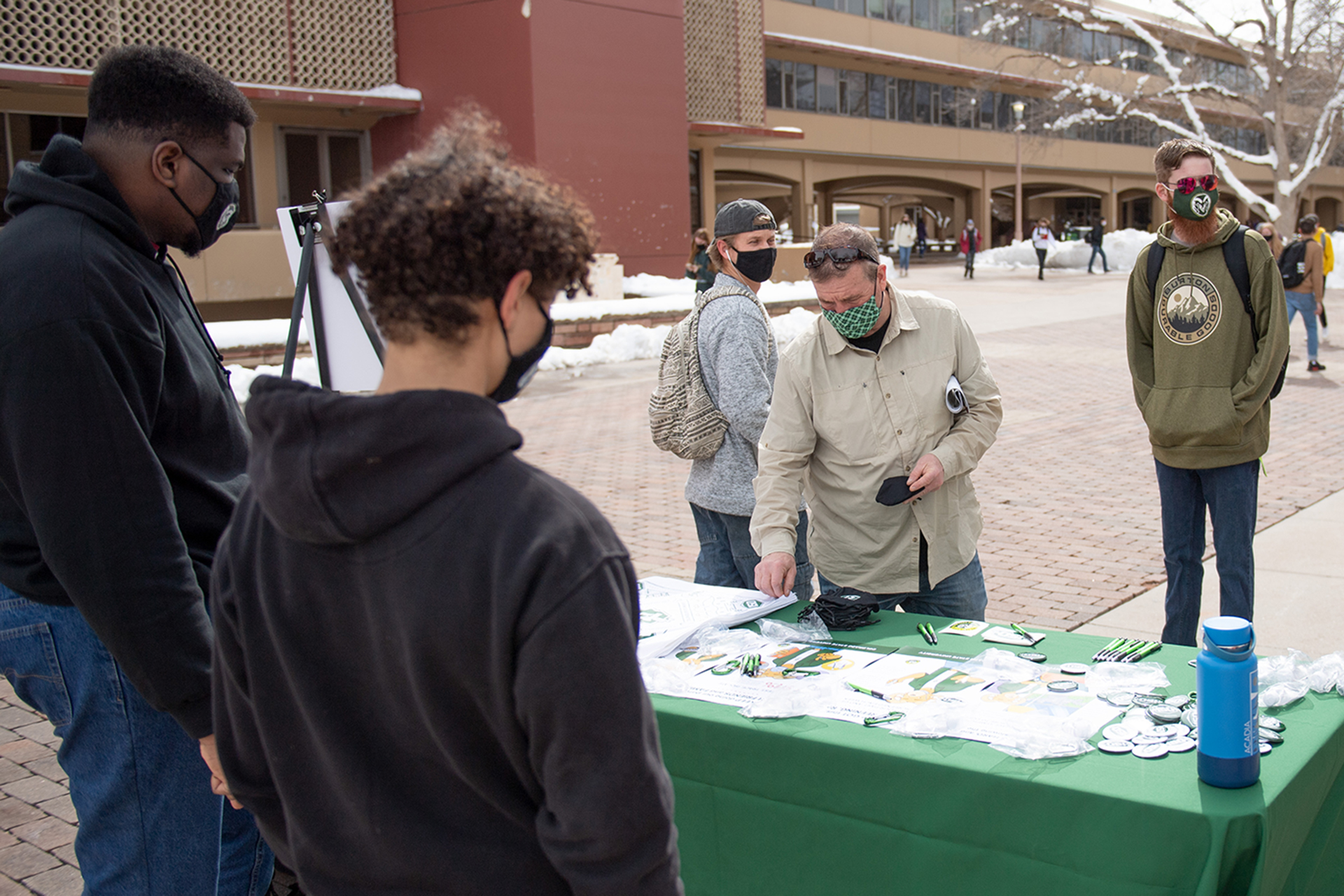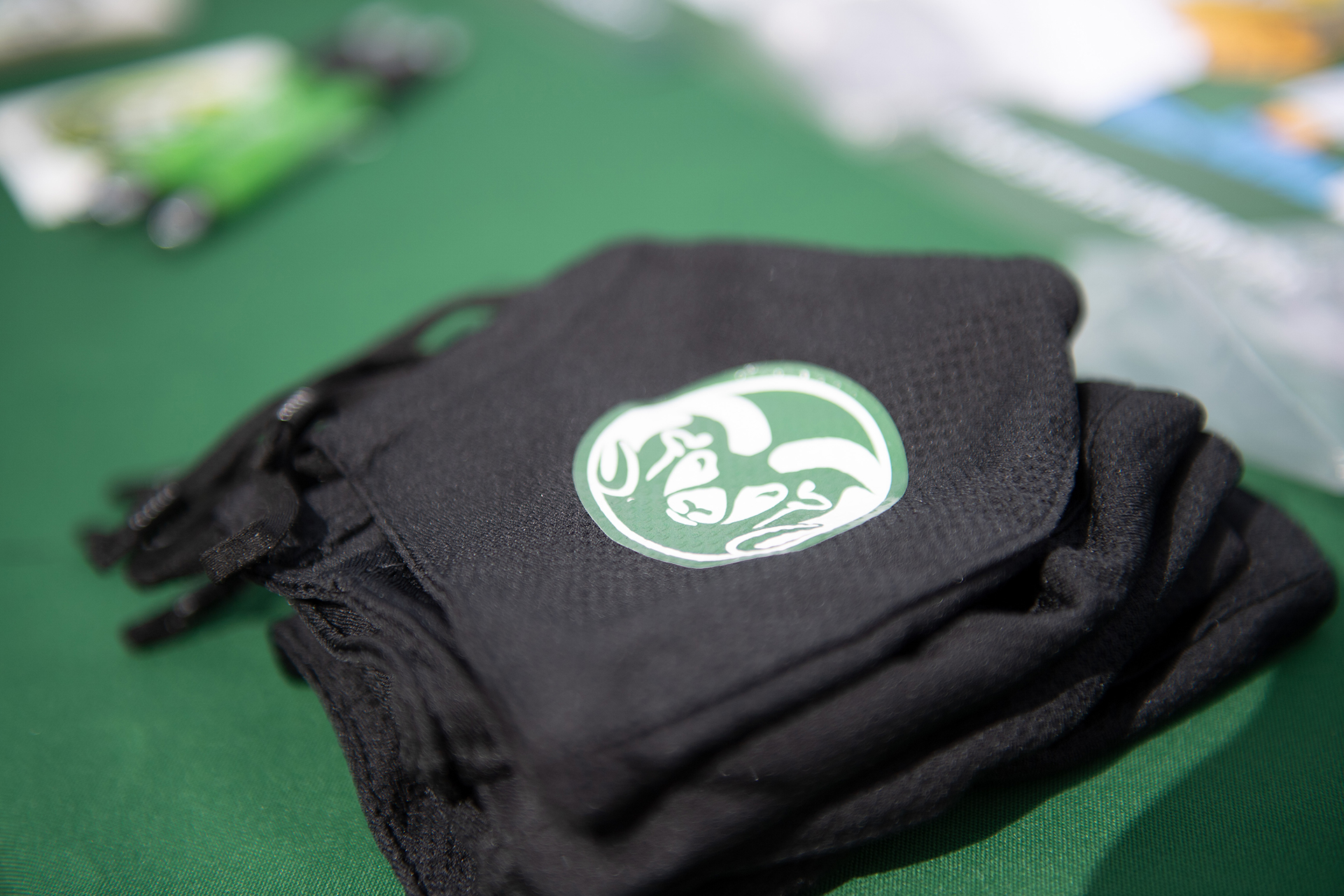
CSU Public Health Ambassadors meet with people outside of Morgan Library. Photo by John Eisele/CSU Photography
Twenty Colorado State University students are part of a new, innovative program designed to promote public health behaviors to help stop the spread of COVID-19.
The student Public Health Ambassadors are stationed in visible places on campus to encourage their peers to follow five key health behaviors: wearing face coverings, practicing physical distancing, washing hands and using hand sanitizer, keeping gatherings small, and staying home when sick.
The initiative is the latest from CSU’s Social Norming Task Force, a committee of more than two dozen faculty, staff and students charged with correcting misperceptions students may have involving public health behaviors.
Social Norming Task Force members Ali Raza and Tyler Alvarado, who lead the Public Health Ambassadors, said the program gives students an opportunity to be an exemplar to the CSU community.
“Faculty and staff can certainly provide the messaging and provide the support, resources and incentives, but that doesn’t resonate with the students in the exact same way as it does when it’s coming from their own peers,” said Raza, assistant director for involvement in CSU’s Student Leadership, Involvement & Community Engagement office.
Student ambassadors


The ambassadors provide health information and resources, including face coverings and hand sanitizer. Photos by John Eisele/CSU Photography
The ambassadors are placed in high-traffic areas across campus, including the Lory Student Center, Morgan Library and the Student Recreation Center, among other locations. The ambassadors have resources and information available for students, including face coverings and hand sanitizer.
Sophie Matthews, a junior majoring in human development and family studies, was recently stationed on the Plaza, outside the Lory Student Center as well as near Morgan Library. Matthews said she wanted to become a public health ambassador to do her part to help students stay on campus.
Matthews explained the job entails rewarding students with stickers, face coverings and other items for practicing public health behaviors. She added that the ambassadors also make observations identifying campus areas where compliance is lacking.
So far, based on her interactions, Matthews said the reception from students has been positive.
“We’re not only giving them a sticker,” she said. “We’re also saying: ‘Thank you. You are part of the reason we are still here on campus.’ I can’t see if they have a smile on their face behind their mask, but you get a good feeling because these people are getting rewarded for something that they didn’t think they’d get rewarded for.”
Social norms
In the past year, the Social Norming Task Force has produced a series of messages to encourage public health behaviors, using data to correct misperceptions that students may have about them.
One key data point used in messaging came from an October 2020 task force survey that found 91.3% of students completely or somewhat agreed that they were motivated to practice health behaviors to ensure the health of the CSU community.
Raza explained the idea for the Public Health Ambassador program is the next step in the task force’s mission to help students to protect themselves and others.
“CSU has been doing a really great job,” Raza said. “This is not a reaction to anything negative. But more of: How can we continue to reinforce the five key behaviors? How can we continue to support our students? And more importantly: How are we getting students involved to lead these efforts?”
As part of the program, the ambassadors took part in intensive training, led by Alvarado and Raza, that focused on leadership and the importance of providing feedback in ways that would educate students on public health behaviors.
Training included a focus on motivational interviewing, a method of non-judgmental communication facilitated by CREWS — Creating Respect, Educating Wellness (by and for) Students — a long-running peer education student organization within the CSU Health Network.
The training also provided sessions on marketing and communication as well as a talk from the task force’s co-chairs, Jody Donovan, the assistant vice president for student affairs and dean of students, and Laura Giles, associate executive director of Housing and Dining Services.
“We are so excited for this next phase of the Social Norming Campaign,” Giles said. “The health ambassadors are a true testament to what we have articulated each step of the way Rams Take Care; Rams Take Action. These students are making a difference at CSU and want to help reduce the spread of COVID-19. We are very grateful for them.”
Alvarado and Raza said they anticipate the program going into the summer, with the possibility of it continuing during the Fall semester. Beyond COVID-19, Raza said the program has the potential to be used for future health communication efforts, in collaboration with the CREWS peer education program.
“The COVID-19 pandemic isn’t the only public health issue affecting students,” Raza said. “This really sets a good foundation for addressing other public health matters in our own backyard.”